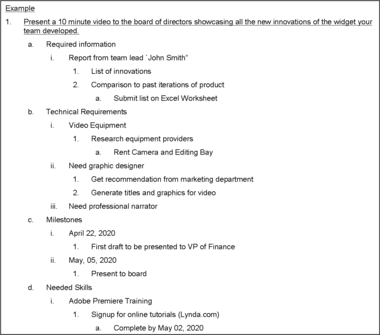Overcome your doubts by focusing on a successful outcome, developing a positive attitude and following a structured plan. Here is a guideline to help you take on any task or project.
Get a firm understanding of what you are trying to achieve
Define the goal of the project and condense it to its core objective. It will give you a succinct idea of what actions you need to take to achieve this objective. Also, take a cursory inventory of the milestones, people and skills that will be involved in reaching your objective.
Doubts come from facing the unknown. Encapsulating important information gives you an easy reference to keep you confident and focused.
Focus on the “what” and not the “how”
People clutter their brain with an over emphasis on maintaining a budget, delegating people and using complicated project management tools Remove yourself from the “how” mindset and become a visionary. Sit back, take what you know from your early notes and come up with an image of what you want to accomplish. Visualize success. Confidence in your abilities will come from focusing on the certainty of success, not the possibility of failure.
Feel confident about your work experience and talents
Skills are transferable and your unique qualities will strengthen any endeavour. People define a great career by the ever-increasing amount of faith and responsibility given to an employee over many years of service. Consequently, you challenge an employee with tasks outside their comfort zone to test if they are ready to be leaders. A new generation of executives and managers are becoming jacks-of-all-trades and masters of some. You may not be able to draw a straight line, but if having that skill is important to the project, odds are you will learn how to do it.
Maximize every interaction with your manager or client
A lack of feedback will magnify your fears. In most cases, you are building on ideas and products other people have already developed. Use that to your advantage and do not frustrate yourself by trying to reinvent the wheel. Instead, work with the people that have built the foundation of the project. In the end, they are your most critical audience. Being dismissive and closed-minded makes your job harder. Take time to digest the material you have gathered, and come back to the decision makers to ask questions that are more specific. This helps guarantee you are making the right decisions. Be aggressive but diplomatic in getting the answers you need. Carefully construct your questions and be adaptable to the answers even if it is not what you want to hear.
Commit to your plan of attack
People over think creative endeavours, they wander from one idea to another. However, they never take in to account the chaos this type of flip-flopping causes along the way. Be flexible, but at all costs try to stick to your original vision. Once you are dedicated to the path and destination, your job is to delegate, manage and deploy to get there.
Contribute when you can and ask for help when you cannot
If you are not artistic, but more of a right brain thinker, you may feel sheepish about offering your opinion on aesthetic issues. However, try to remember that everyone fills different need on a team. Ultimately, a good team blends the best of everyone’s talents, and what skill one person lacks the other brings to the project. Your job is to guide them, trust their input, offer your knowledge and lastly, help them flesh out your ideas.
Use the internet
Take your time and see what others have accomplished with similar projects. Inspire yourself with the achievements of others, but beware the many dangers of plagiarism.
Draw from the many assets your company has to offer
Make a general request across the company for help. This type of crowd sourcing reduces cost by keeping everything in house. It also exposes internal talent, and brings in fresh ideas to any endeavour. Remember, it is natural to be hesitant when presented with what first appears to be an overwhelming project. However, you can overcome this challenge by confirming your objectives, believing in your skills, drawing confidence from your experience and standing firmly behind your choices.
